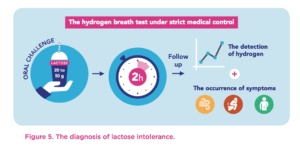What is Lactose Intolerance?
When a baby cries incessantly and passes loose stools frequently it causes a lot of anxiety to the mother. If the child passes loose stools whenever a milk feed is given and the stools are frothy, explosive, it is a condition of Lactose Intolerance, says Consultant Pediatrician Dr. Rajam Natarajan.
Lactose is a disaccharide, formed by the combination of glucose and galactose. It is the predominant sugar of milk and milk products which we normally consume like butter, cheese, canned and frozen foods like cereal, salad dressing etc. the lactose sugar in the diet is digested by the enzyme border of the small intestinal mucosal lining. It is hydrolysed to simple sugar and used by the different systems of the body.
In some persons, this lactase enzyme may be deficient or may be completely absent. They suffer from “Lactose Intolerance”. Lactose deficiency may be primary or secondary.
Are you boiling milk the right way? Find out.
Types of lactose intolerance:
Primary or congenital deficiency in inherited as an autosomal receive disorder and reported in a few cases. The intolerance relates to the developmental pattern of lactase activity which rises relatively late in foetal life and begins to fall after 3yrs. Hence intolerance to lactase can be anticipated in very premature infants and in some older children.
Secondary lactase deficiency is very common. The brush border of intestinal villi can be destroyed by the viral or bacterial infection or by the ingestion of some drugs for a prolonged period.
Rarely it can also occur due to some immunologic reactions in the body. Since the lactase enzyme is absent the lactose is converted to lactic acid and co2. Lactic acid gets accumulated and cause acidic watery stools which are frothy. Co2 is excreted which cause sound while passing the stools. The acidic nature.
Nature of stools causes excoriation around the anal opening the gas production leads to abdominal distension flatulence and crampy abdominal pain. This needs immediate attention and a doctor should be consulted.
Are you eating enough curd every day? Find out.
Tests for lactose tolerance & intolerance:

Pic courtesy: yoghurtinnutrition.com
The most common tests used to measure the absorption of lactose in the digestive system are the lactose tolerance test, the hydrogen breath test and the stool acidity test.
The lactose tolerance test begins with the individual fasting before the test and then drinking a liquid that contains lactose several blood samples are taken over a 2 hr period to measure the person’s blood glucose level which indicates how well the body in able to digest lactose.
The hydrogen breath test measures the amount of hydrogen in a person’s breath normally very little hydrogen in detectable. Here undigested lactose in the colon is fermented by bacteria and various gases including hydrogen are provided. The hydrogen is absorbed from the intestine, carried through the blood stream to the lungs and exhaled.
The lactose tolerance and the hydrogen tests are not given to infants and very young children who are suspected of having lactose intolerance. A large lactose load may be dangerous for the very young because it may cause continuous loose stools and severe dehydration.
A stool acidity test which measures the amount of acid in the stool may be given to infants and young children. The lactic and other short-chain fatty acids can be detected in a stool sample.
What are the different types of milk available? Find out.
What parents of children with lactose intolerance should know:
- In the above condition, the child should be given a diet which is free from lactose. No treatment can improve the body’s ability to produce lactose but symptoms can be controlled through diet. Giving a milk-free diet to an infant is a big task. The ordinary milk can be substituted with soya milk.
- Commercial lactase preparations are available when added to milk it allows asymptomatic consumption of modest quantities of milk incubated with added enzyme.
- A capsule with lactase activity can also be ingested along with milk.
- Yogurt contains good bacteria that produces lactase enzyme and is well tolerated.
- Probiotics can be tried.
